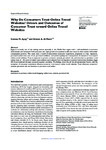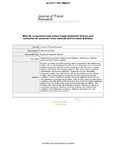Why Do Consumers Trust Online Travel Websites? Drivers and Outcomes of Consumer Trust toward Online Travel Websites
| dc.contributor.author | El-Masry, AA | en |
| dc.contributor.author | Agag, G | en |
| dc.date.accessioned | 2016-05-22T08:11:26Z | |
| dc.date.accessioned | 2016-08-15T17:55:05Z | |
| dc.date.accessioned | 2016-08-15T18:13:38Z | |
| dc.date.available | 2016-05-22T08:11:26Z | |
| dc.date.issued | 2017-03-10 | en |
| dc.identifier.issn | 0047-2875 | en |
| dc.identifier.uri | http://hdl.handle.net/10026.1/5301 | |
| dc.description.abstract |
Egypt is currently one of the leading nations especially in the Middle East region with a well-established e-commerce environment and advanced IT infrastructure, but rapid growth of e-commerce will soon occur in other nations with similar consumption patterns. This study tests a model of antecedents (consumer experience, propensity to trust, reputation, perceived website size, ease of use, perceived usefulness, and website quality) and consequences of consumers’ trust toward online travel websites. Trust is expected to predict consumer attitude, perceived risk, and intention to purchase travel online. Data of 1,431 users of online travel websites were selected from the Supreme Council of Universities Database–Egypt (SCU) and analyzed through structural equation modeling. The findings show that all the aforementioned factors with the exception of consumer experience influence consumer trust toward online travel websites. Trust influences consumers’ attitude, perceived risk, and intention to purchase travel online. | en |
| dc.format.extent | 347 - 369 | en |
| dc.language.iso | en | en |
| dc.publisher | sagepub.com/journalsPermissions.nav | en |
| dc.relation.replaces | http://hdl.handle.net/10026.1/4697 | |
| dc.relation.replaces | 10026.1/4697 | |
| dc.relation.replaces | http://hdl.handle.net/10026.1/5300 | |
| dc.relation.replaces | 10026.1/5300 | |
| dc.subject | intentions to purchase, online travel shopping, online trust, attitude, perceived risk | en |
| dc.title | Why Do Consumers Trust Online Travel Websites? Drivers and Outcomes of Consumer Trust toward Online Travel Websites | en |
| dc.type | Journal Article | |
| plymouth.issue | 3 | en |
| plymouth.volume | 56 | en |
| plymouth.publisher-url | http://sagepub.com/journalsPermissions.nav | en |
| plymouth.publication-status | Published | en |
| plymouth.journal | Journal of Travel Research | en |
| dc.identifier.doi | 10.1177/0047287516643185 | en |
| plymouth.organisational-group | /Plymouth | |
| plymouth.organisational-group | /Plymouth/REF 2021 Researchers by UoA | |
| plymouth.organisational-group | /Plymouth/REF 2021 Researchers by UoA/UoA17 Business and Management Studies | |
| dcterms.dateAccepted | 2016-02-14 | en |
| dc.rights.embargodate | 2017-04-10 | en |
| dc.identifier.eissn | 1552-6763 | en |
| dc.rights.embargoperiod | Not known | en |
| rioxxterms.versionofrecord | 10.1177/0047287516643185 | en |
| rioxxterms.licenseref.uri | http://www.rioxx.net/licenses/all-rights-reserved | en |
| rioxxterms.licenseref.startdate | 2017-03-10 | en |
| rioxxterms.type | Journal Article/Review | en |



